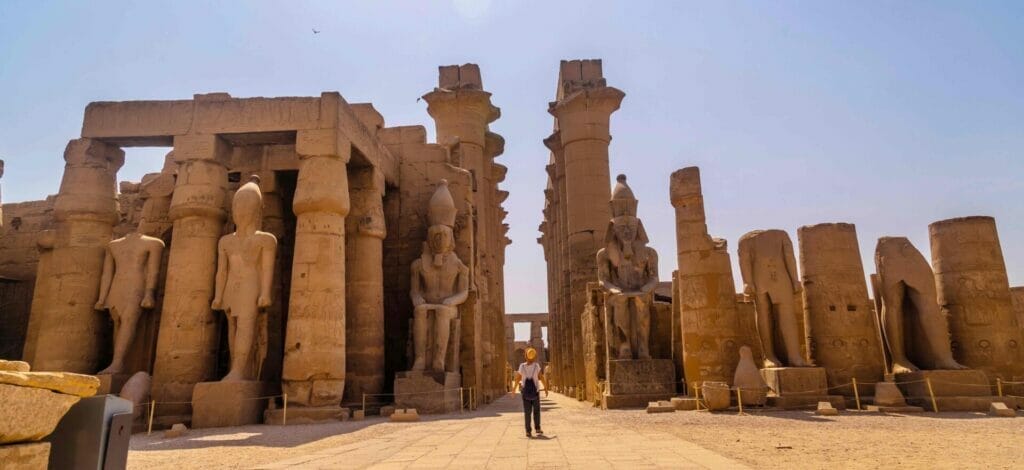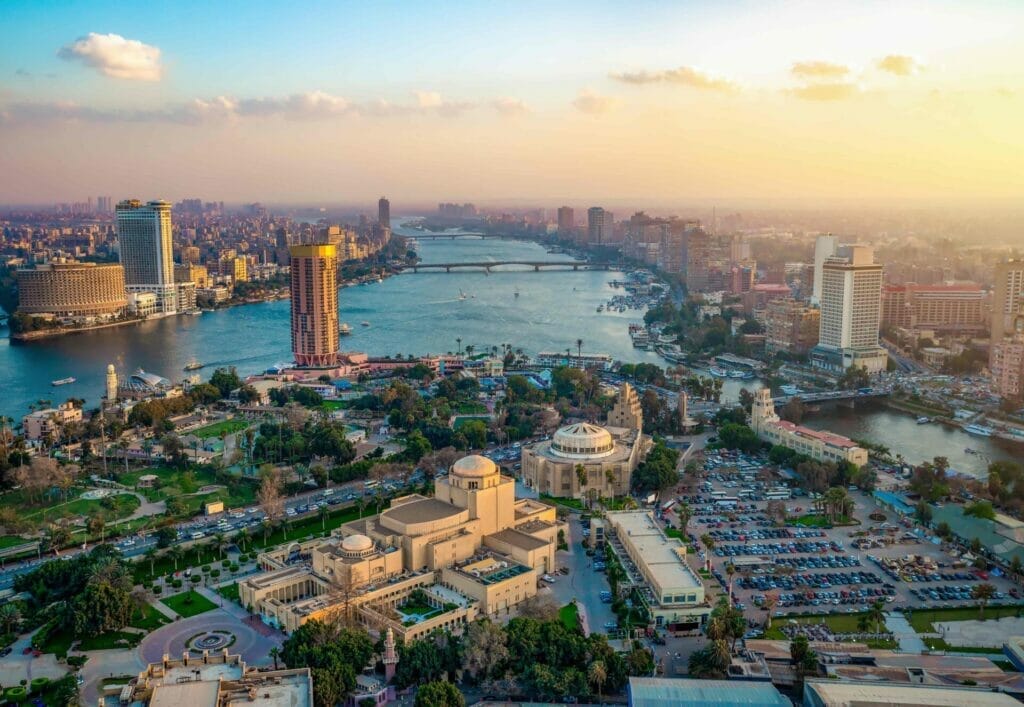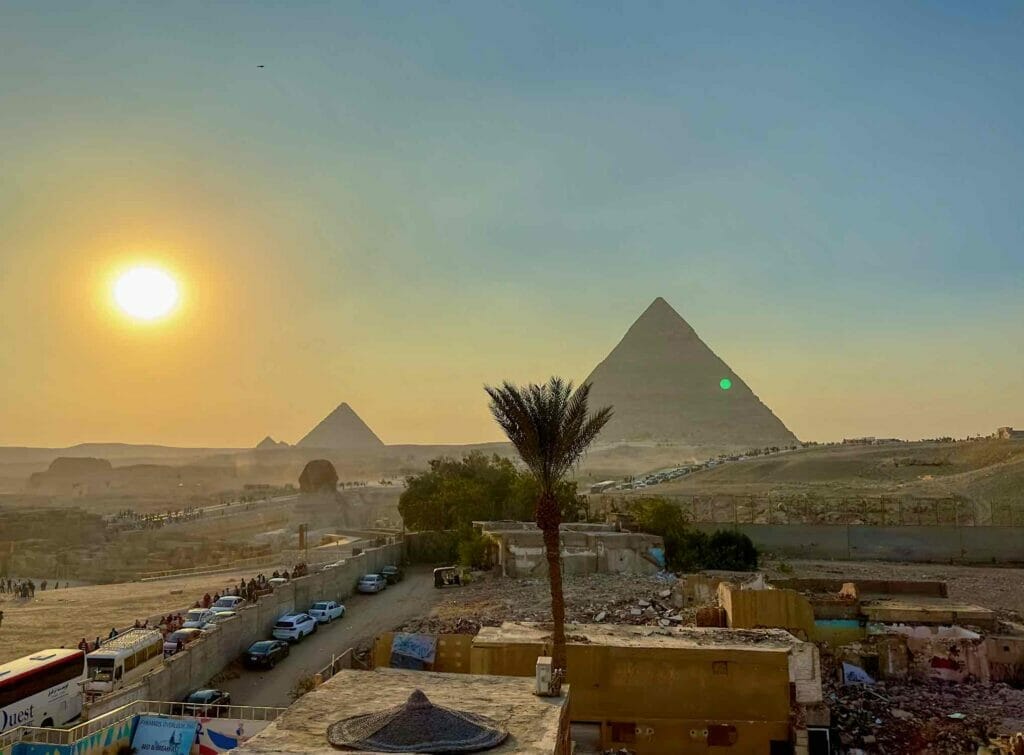Egypt
Egypt is one of the most mysterious destinations on the planet, and it’s been on our bucket list for years! Between the Nile, the Red Sea, Alexandria, Cairo, and pyramids that date back to 2500 BC, there’s so much history and culture to experience.
Below you will find a guide to the country and comprehensive guides to all things Egypt.

Best Time To Visit

The best time to visit Egypt is between October and April, when temperatures are cooler, but still pleasantly warm across the country. This makes exploring the busy streets of Cairo, visiting the Pyramids in the desert, and exploring ancient Pharaonic tombs more comfortable and enjoyable.
The summer season (May to September) is hot, although the high temperatures are alleviated by very dry air, air conditioning, far fewer visitors and lower prices. This means summer is still a viable season for your trip. There also tends to be a bit of a breeze on the Nile, making a river cruise a good choice during this period.
What To Expect
Capital: Cairo
Language: The official language of Egypt is Egyptian Arabic. ‘Hello’ and ‘Thank You’ in Egyptian: “salām ‘alaykum” and “shukrān”
Currency: The official currency of Egypt is the Egyptian Pound (EGP). £1 GBP is equivalent to 22 EGP. Check the latest rates here
Credit Cards & ATMs: In Egypt, CASH IS KING, but you will find that many bars, restaurants, shops, and hotels will take major debit and credit cards. Some shops will have a sign near their entrance that tells you whether or not they accept foreign cards. If you’re looking to carry some cash during your visit, you can find many ATMs throughout big cities like Cairo and Alexandria.
Plugs: In Egypt, the power plugs are type C and F. The standard voltage is 220 V, and the standard frequency is 50 Hz. I recommend buying a universal adapter
Safety: Egypt is a relatively safe place to visit, as long as you keep your wits about you and adhere to the local cultural customs. Egypt’s crime rates are low but be aware of scam artists and pickpockets which can be common. If it seems too good to be true, it probably is!
Random useful tip: The tap water in Egypt is heavily chlorinated and unsafe. It’s okay for brushing your teeth with, but don’t drink it. Buy bottled water. It’s easy to get and only costs 5 EGP (0.28 USD) for a 1-litre bottle.
Never ever: Don’t talk to people who approach you in public areas offering services like city tours, special visits to tombs, sites or shops…etc. It’s always safer to use registered tour operators and agents.
Top 5 Things to See and Do in Egypt
(Note: Egypt is brimming with activities. Truly, there’s an abundance to explore and experience. The following are just a few of our top picks. For more country-specific activities, refer to the detailed guides linked to each country below!)
The Pyramids of Giza, standing majestically on the outskirts of Cairo, are the last of the original Seven Wonders of the Ancient World. The largest, the Great Pyramid of Khufu, is a staggering feat of ancient engineering, drawing visitors from all corners of the globe. Beside the pyramids, the enigmatic Sphinx, with its lion’s body and human head, holds centuries of secrets. While many come during the day, the evening light show, which illuminates these ancient structures, offers a unique perspective on their timeless splendour.
The Nile, the lifeblood of Egypt, offers a serene journey through the country’s history. Sailing on a traditional wooden felucca, visitors can drift along the river’s gentle currents, flanked by palm-fringed banks and ancient temples. As the sun sets, casting a golden hue over the waters, one is transported to the days of pharaohs and ancient civilisations. Whether it’s a short sunset cruise or a multi-day journey, sailing the Nile is an experience steeped in tranquillity and tradition.
Luxor, once the ancient city of Thebes, is an open-air museum of monumental proportions. The sprawling Karnak Temple complex, dedicated to the gods Amun, Mut, and Khonsu, boasts a forest of towering columns, obelisks, and sanctuaries. A short distance away, the Luxor Temple, illuminated beautifully at night, offers tales of pharaohs and gods carved in stone. Crossing the Nile to the Valley of the Kings, visitors can explore the intricately decorated tombs of Egypt’s most illustrious rulers.
Sharm El Sheikh, located on the Sinai Peninsula, is a paradise for underwater enthusiasts. The Red Sea’s crystal-clear waters unveil a kaleidoscope of corals, colourful fish, and marine life, making it one of the world’s premier diving destinations. Ras Mohammed National Park, with its vibrant reefs and shipwrecks, promises an aquatic adventure like no other. For those who prefer to stay on land, the desert landscape offers thrilling safaris, Bedouin dinners, and star-gazing excursions.
The historic heart of Cairo, known as Islamic Cairo, is a treasure trove of mosques, madrasas, and monuments. The 1,000-year-old Al-Azhar Mosque, with its graceful minarets and vast courtyard, stands as a testament to Islamic architecture. Nearby, the Khan El Khalili bazaar bustles with activity, as vendors peddle everything from spices and perfumes to handcrafted jewellery. Meandering through these narrow alleys, with the call to prayer echoing in the background, visitors are immersed in the rich tapestry of Cairo’s cultural and spiritual life.
Travel Guides
Below you will find guides on places in Egypt, reasons to visit Egypt, and how to travel Egypt on a budget.
Book tours and purchase tickets
Travel Resources
*Disclosure: Please note that some of the links above may be affiliate links, and at no additional cost to you, I earn a commission if you make a purchase. I only recommend products and companies I use and the income goes to keeping the site community supported and ad free.









